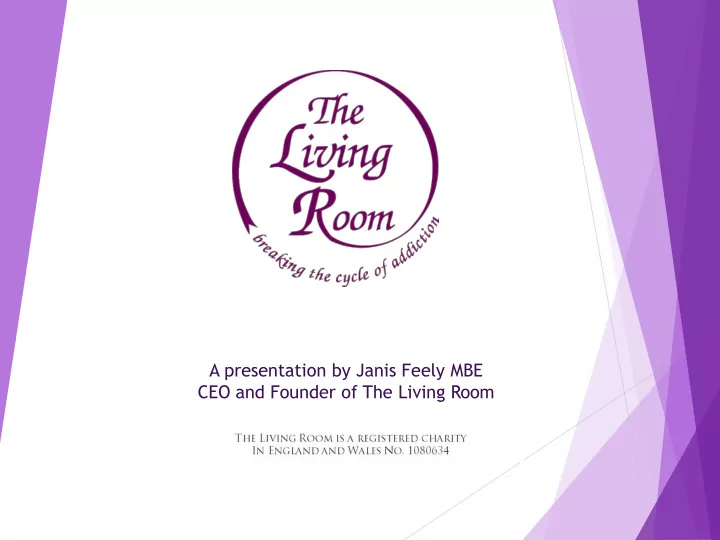

A presentation by Janis Feely MBE CEO and Founder of The Living Room
About of The Living Room Opened doors May 2000 as a non-residential rehab • Based on my insights both as a person in recovery and as an • ex-rehab worker We have won many awards for our work at a national and local • level • Grown from a community centre hall to two projects in Stevenage and St Albans
Our Approach: Founded on 12-Step tradition, but incorporates CBT and humanistic • approaches All counsellors are in long term recovery and qualified to Diploma • level or higher All addiction are covered by our service, we treat underlying thought • processes • We offer a structure day service that fosters a loving recovery community and that is not clinical We work with local advice and support agencies to ensure all client • needs are met
Some of the addictions we work with: Spending/debting Alcohol internet addictions Illicit drugs relationship addictions prescription drugs gambling disordered eating self-harm
Supporting Families and Friends In ‘caring’ for their loved one, people often compromise their: • Friends and social support networks Sense of identity and self-respect • Hobbies and interests • • Their sense of wellbeing and mental health For their addicted partner, child or parent they can often: Lie to protect them • Try to hide drugs, alcohol or the addictive behaviour • • Try to control their behaviour Buy drugs or drink • At The Living Room we support people to: Not enable their loved one’s addiction • • To understand the illness of addiction To reduce co-dependent and controlling behaviours • • To reconnect with their identities, interests and support networks To build up self-esteems and confidence •
Warwick (Permission to share story and photo’s given by client) Before Attending The Living Room After Attending The Living Room Poly drug user for many year, Three years free of drug addiction. Including addictions to Heroin. Runs own horticulture business. Living on the streets of London, Local secretary of Narcotics Girlfriend died of overdose. Anonymous.
Outcomes and measuring our success 60% of all clients who engage in therapy leave abstinent • • A Social Return on Investment of x8 (based on comparing costs of service, against costs incurred by an individual if they had not received therapy, such as welfare, health and criminal costs. We use clinically recognised measuring tool CORE PC to measure changes in wellbeign amongst clients. We measure abstinence rates at various stages of the client’s recovery journey We have just begun to measure co-dependency rates of our Family and Friends clients using the Spann-Fischer Co-Dependency Scale
Funding We are funded by Public Health, Trusts and Foundation and • fundraising in the local community, including working with local community groups such as the Rotarians • We run charity shops where clients can learn skills and develop confidence
Questions And Answers
Recommend
More recommend